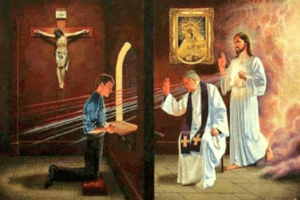“Christ instituted the sacrament of Penance for all sinful members of his Church: above all for those who, since Baptism, have fallen into grave sin, and have thus lost their baptismal grace and wounded ecclesial communion. It is to them that the Sacrament of Penance offers a new possibility to convert and to recover the grace of justification. The Fathers of the Church present this sacrament as “the second plank [of salvation] after the shipwreck which is the loss of grace.” (CCC 1446)
Reconciliation/Confession Schedule:
Wednesdays 6:30 P.M.-7:30 P.M. & by appointment
Please do not hesitate to contact Fr. Dandeneau for an appointment if Wednesday from 6:30 P.M-7:30 P.M. is inconvenient for your schedule.
Introduction
The Sacrament of Reconciliation/Confession is an extremely important practice in our faith. The Lord Jesus Christ established it as the ordinary means by which sin would be forgiven and those guilty of sin reconciled to God.
However, the Sacrament of Reconciliation can be intimidating. The reason is that starting when we were children we had the negative experiences of punishment, judgment, disappointment, guilt, and embarrassment that someone knew when we admitted to having done something wrong. This is a very reasonable rationale for having an aversion to this sacrament. But if we reflect more deeply on what God is doing through Reconciliation, what we discover is that it is actually much more optimistic and can be a joyful experience.
Concerns Regarding the Practice of the Sacrament
Fear of Punishment
Everyone has some degree of fear of punishment. None of us wants negative consequences. Even when we accept that we have done wrong and deserve retribution for our actions, we still have an aversion to the pain or suffering we will have to endure. Sometimes we even try to hide our wrongdoings or are dishonest because of them. The good news about God, though, is that He doesn’t want us to suffer. He created the Sacrament of Reconciliation precisely so that we wouldn’t have to. In fact, the truth of the matter is that the only way we will suffer is by avoiding the Sacrament of Reconciliation.
Fear of Being Judged
No one likes to be judged negatively, especially when it comes to their sins. This is because so often we have experienced being seen in a negative way as a result of or even defined by our sins. For those with a sense of the faith, the feeling or experience of being judged can be aggravated by knowing the Church’s law and encountering others who have allowed themselves to become self-righteous from knowing and following it externally. For example, if we have lied in the past, many condemn us as a liar. For another example, if we have stolen in the past, many would consider us a thief. God does not look at us this way. We are all His children and He regards us as such. Sin distances and can even isolate us from Him, but He is always anxiously awaiting our repentance and reconciliation with Him (cf. Luke 15:11-32).
Fear of Disappointing God
It is also extremely uncomfortable to face the prospect of disappointing another, especially God. No one wants to disappoint someone else they care about and when we do this it can be truly devastating. But we are called to keep in mind that because God is God, He already knows everything about us. God knew billions of years ago-from all eternity, in fact-what sins each of us will commit tomorrow and, or, a year from now. Nothing is a surprise to Him. Yet He continues to love us with perfect love in spite of what sins we have committed, the sins we are currently committing, and the sins we will commit tomorrow. Jesus Christ died on the cross because He knew the evils of sin and He triumphed over it once and for all by taking our sins upon Himself, dying on the cross in atonement for them, and rising again from the dead on the third day.
Embarrassment of our sins
Another reason many have an aversion to the Sacrament of Reconciliation is the feeling of embarrassment that often comes when we admit to having done something wrong. Even if we are able to work through having a fear of punishment, the idea of someone knowing that we have done wrong and what it is can be overwhelmingly uncomfortable. We have a right to a good name and want others to have a healthy sense of respect for us, especially our spiritual and moral leaders-our priests. So when we know we have made the wrong choice or acted wrongly, we tend to want to forget it and ensure it is as little known as possible. In this regard, what we have to remember is that the role of the priest in the Sacrament of Reconciliation is really more like a liaison between the person receiving the Sacrament and God. The Sacrament of Reconciliation, because it is a sacrament, is an encounter between the individual and God. Here, the role of the priest is simply to assist the individual in assessing his or her spiritual/state, the degree of responsibility he or she has for his or her sins, assign a penance which corresponds to the need to express good will and make satisfaction to justice for the sins perpetrated, and absolve the individual or his or her sins, reconciling him or her with God. It is really God who lifts the burden of sin from us, guides us, forgives us, and reconciles us to Himself. The priest is there to provide the ability for this encounter to take place as God’s minister and delegate/spokesperson. The other point that is essential in addressing the concern about the possibility of being embarrassed is that because of the role the priest plays, he is not listening so as to gain information or knowledge for himself. Furthermore, according to Canon Law (the law of the Church) priests who hear a person’s confession are not allowed to use any of the private/secret knowledge acquired within the Sacrament of Reconciliation to the detriment of the person who has confessed. Canon Law imposes the highest form of penalty-that of automatic excommunication-to any priest or bishop who betrays a person who has confessed their sins by revealing their identity and the sin(s) of which he or she is guilty.
Format of Sacrament of Reconciliation and Penance
- Priest formally greets penitent (May God who has enlightened every heart help you to know your sins and trust in His mercy)
- Penitent begins by making the sign of the cross while saying: “Bless me Father, for I have sinned. (It has been [# of days, weeks, months, years] since my last confession and these are my sins)”
- If the penitent does not state the length of time (second sentence in #2 above) the priest/bishop asks: “How long has it been since your last confession?” and the penitent answers.
- The priest/bishop will then ask, “In that time, what sins have you committed?”
- The penitent states the specific type of sin and the number of times he/she has committed that specific type of sin. *Please note that if the sin is specified-e.g., “I lied five times”-it is not necessary to provide details/additional information unless such details impact the seriousness of the sin(s). If “I lied five times” about what I did on Saturday night to avoid spending time with friends who encourage sin, this is different than if “I lied five times” about what I did on Saturday night to police who are investigating a murder.
- The penitent is also supposed to state the number of times he or she committed each sin that is confessed. If the penitent genuinely cannot remember, he or she is to provide the most accurate information possible about the frequency of the sin.
- All sins should be confessed. However, it is of the utmost importance that all mortal sins are confessed and given priority in the practice of the Sacrament of Reconciliation.
- Based on the content of the confession, the priest or bishop might give advice and, or, encouragement to the penitent to help them make changes to avoid such sins in the future.
- The priest or bishop gives a penance (usually a prayer or sequence of prayers) to the penitent which in a small way should correspond to the confession made as the fulfillment of the penance is a matter of justice, i.e., expressing good will and in a small way expressing one’s sorrow and desire to change to God.
- The penitent either says or is asked by the priest to say the Act of Contrition.
- There are different forms of the Act of Contrition. Here are a few:
- Oh my God, I am heartily sorry for having offended You. And I detest all of my sins because I dread the loss of Heaven and the pains of Hell (sometimes replaced with “Your just punishments”) but most of all because they offend You, my God, Who are all good and deserving of all of my love. I firmly resolve, with the help of Your grace (to confess my sins, do penance, and amend my life)-sometimes the last line in parentheses is changed to (“to sin no more and avoid the near occasions of sin”). Amen.
- Forgive me my sins, Oh Lord, forgive me my sins; the sins of my youth, the sins of my age, the sins of my soul, the sins of my body; my idle sins, my serious voluntary sins; the sins I know, the sins I do not know; the sins I have concealed for so long and which are now hidden from my memory. I am truly sorry for every sin, mortal and venial, for all the sins of my childhood up to the present hour. I know my sins have wounded Your Tender Heart. Oh my Savior, let me be freed from the bonds of evil through the most bitter Passion of my Redeemer. Amen.
- When necessary, a shorter form is acceptable: Lord Jesus Christ, Son of the living God, have mercy on me, a sinner.
- The priest/bishop then prays the prayer of Absolution. Sometimes this prayer is done incorrectly or improperly. The prayer as revised recently by the Church is now:
- Please note the prayer used by the minister for absolution is standard and given by the Church itself. Any change to it is inappropriate on the part of the minister. If this happens, penitents have the right to request the priest/bishop use the correct/appropriate form for the sacrament that is provided by the Church (that is, the words as instructed by the Church). The validity of the sacrament in part depends upon the correct form of absolution being given. The absolution itself is the last line of the prayer said by the minister: “I absolve you from your sins, in the name of the Father, and of the Son, and of the Holy Spirit”. Anything else is questionable and the proper form should be requested by the penitent.
This Sacrament gives Christ’s faithful the further possibility of conversion. All of us know that we are not perfect and depend on God for the grace necessary to change our lives. Through Confession, we announce our sins to the priest who sits “in persona Christi” (in the person of Christ) and exercises the command of Christ to His Apostles, “Whose sins you forgive are forgiven them, and whose sins you retain are retained.” (Jn 20:23)

